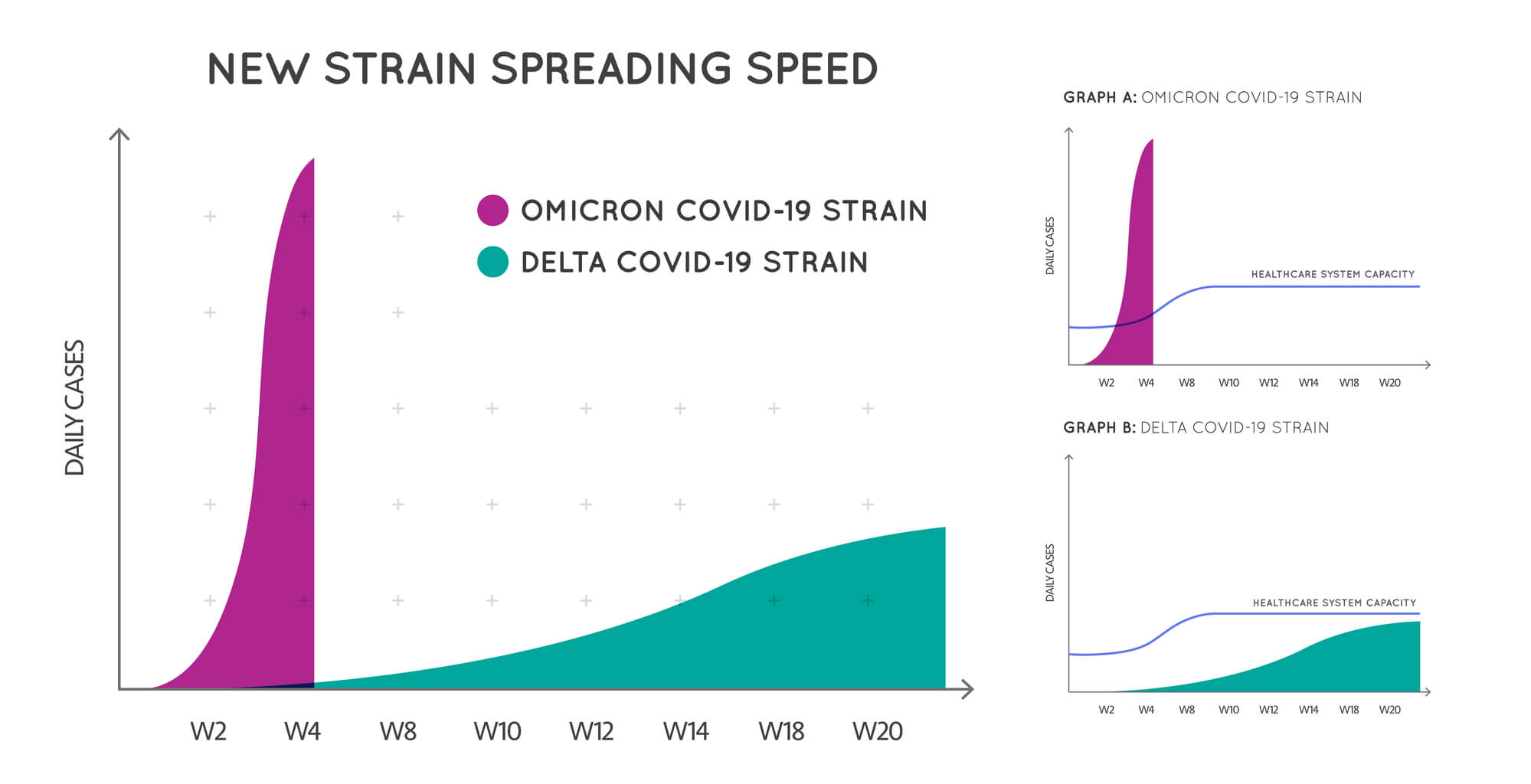The main concern is the weakening of the response of the vaccines to the Omicron variant is due to the appearance of 32 mutations in the spike protein. To reduce the risks of creating new dangerous variants, the researchers suggest increasing the production of vaccines and their coverage mainly in developing countries
By Jennifer Juneau, Senior Research Fellow, Peter Doherty Institute of Infection and Immunity and Adam Wheatley, Senior Research Fellow, Department of Microbiology and Immunology, University of Melbourne
The emergence of the omicron version of the SARS-CoV-2 coronavirus that causes the disease COVID-19 has reignited global debates about vaccine distribution, virus mutations, and immunity against new virus strains. There were experts, such as Magal Omicron from South Africa, who speculate that the emergence of a new strain may be the result of low levels of vaccine coverage in developing countries.
So how are new versions of viruses created? And what is the role of the vaccine? The connection is still unclear but here's what we know so far.
Viruses naturally mutate during replication
A virus is life in its simplest form, and mainly contains two main components: (1) a reproductive program (made of DNA or RNA as in the case of the corona virus), and (2) proteins that allow the virus to enter cells, take over its mechanisms and start multiplying.
If the virus reaches the lungs, it replicates rapidly and creates millions of virus particles. Some of these viruses are inhaled and infect other hosts.
It is important to note that the RNA replication process of the virus is not perfect. Eventually errors will accumulate in the virus pool and cause what we call virus variants.
What are variants of SARS-CoV-2 and why are some of them worrisome?

When viruses are passed from one person to another, some of the new variants created in the previous host will be more successful at entering cells or replicating themselves than others. In these cases, it is more likely that the "suitable" variants will take over and become the main virus replicating within a population.
During the epidemic, the phenomenon occurred several times. The original SARS-CoV-2 virus that came out of Wuhan in 2019 was later replaced by a variant called D614G, followed by the alpha variant and now, the delta variant. Whenever someone is infected with SARS-CoV-2, there is a chance that the virus will mutate into a more suitable version, which can then spread.
What is the effect of the change in the virus on the vaccines?
Our current vaccines are still very effective against SARS-CoV-2 variants, including the delta strain. The reason for this is that the vaccines target the entire "spike" protein of the virus, which is a large protein with a relatively small number of changes across versions.
In the past, several versions of SARS-CoV-2 (Beta, Gamma, Lambda and Mu) have already been reported to "escape" immunity from the vaccine. This means that the immune system is unable to recognize the mutated virus as well as the original strain, reducing the effectiveness of the vaccine.
So far, however, the global impact of vaccine-evasive strains has been limited. For example, the beta version, which had the highest level of immune evasion, could not compete with delta in the real world.
Do low vaccination rates pose a risk for the creation of new virus variants?
For now, any relationship between vaccine coverage and new variants of SARS-CoV-2 is unclear. There are two main factors that can lead to the development of new versions. First, low vaccine coverage may increase the risk of new variants by allowing transmission within a community. In this case, high viral replication and human-to-human transmission provide ample opportunity for the virus to mutate.
Alternatively, as vaccination rates increase, the only viruses that will be able to successfully infect people will be variants that escape at least partially the immunity provided by vaccines. This scenario may require continued global surveillance efforts and new vaccines to maintain long-term control of the virus, similar to influenza.
Either way, as long as COVID-19 is almost certain to be around, we should expect new strains to continue to challenge healthcare systems. We will need careful and active management to address this risk.
So where did the Omicron variant come from?
Recent reports of an alarming new variant, Omicron, turned on a red light. A variant discovered through impressive sequencing efforts by South African scientists, Omicron contains an astonishing 32 changes in the spike protein alone and contains mutations that can increase transmission and evade vaccines, so there is a risk that Omicron may spread rapidly and reduce (but not eliminate) the effectiveness of current vaccines.
Vaccination coverage in South Africa is very low compared to the West. Some argue that the global inequality in the supply of corona vaccines may be responsible for the emergence of Omicron. However, the extensive mutations in the omicron are consistent with the virus changing over time as it replicated in a person with a compromised immune system. Such highly mutated variants have been documented in the past but have generally not spread widely.
Global immunization coverage benefits us all
Expanding global vaccine coverage by increasing supplies, ensuring fair distribution, and combating hesitancy and misinformation remains critical.
A high global vaccine coverage will limit the overall viral evolution, protect the immunocompromised and reduce the chances of the spread of highly mutated viruses, all of which can directly or indirectly lower the risks of the emergence of new variants.
Since the global community is now very connected, it will be difficult for countries to maintain the security of their citizens against the threats of the epidemic without adopting a framework for greater international cooperation and coordination.
to the article on The Conversation website
More of the topic in Hayadan:


5 תגובות
Radiation from a mobile phone disrupts electricity in Wernicke's area responsible for logic.
What a stupid and biased article that is intended to blame those who are not vaccinated....just one big stupidity and there is no connection between this article and science, and as evidence, the vaccinated are the ones who can get infected and get infected again and again, compared to the unvaccinated who can only get infected once and thanks to them we will decide the virus and fight it . This is a scientific answer. The very fact that those who brought the new mutation to Israel are people vaccinated with three vaccines should open people's eyes. Tired of the stupidity of so many people who sit and listen to television that has long belonged to capitalists who are connected to the government.
Go learn basic lessons in evolution.
Nonsense in the juice... the only reason more variants are created is because the creative team of the World Health Organization is working hard to pressure everyone to put poison into their bodies. What is this propaganda joke page?!
Quickly close it
Why is it so difficult to explain to the public the simple connection between undervaccination and multiple variants? As long as there are billions of unvaccinated people, it is impossible to dream of "herd vaccination" - which is the ultimate goal of any campaign for the final neutralization of a virus. Because every unvaccinated person is a breeding ground for the virus that has entered his body, and viral multiplication always involves mutations, some of which will be more dangerous than the existing ones. The huge numbers are enough to convince the last doubters. The penetration of a few viruses on a piece of rock is enough to start the "virus production factory" in an infected person. When the symptoms break out, that body has already created millions of billions of copies of the virus, some of which are dangerous mutations. The whole world needs to be vaccinated or the movement of people and goods between population concentrations that part of them is not vaccinated should be completely stopped. You will learn from the global victory over smallpox, achieved after 200 years of vaccination and millions of deaths only when the World Health Organization led a global vaccination campaign.